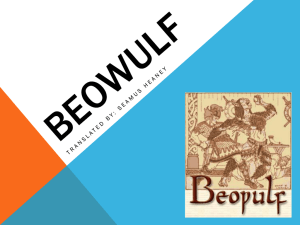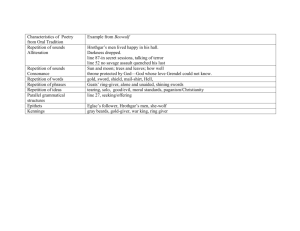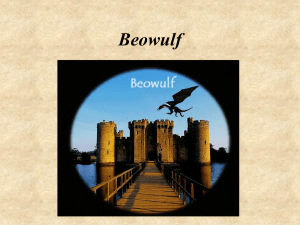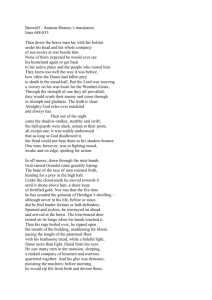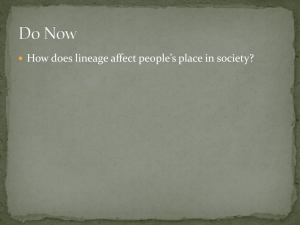PowerPoint Notes from the Anglo
advertisement
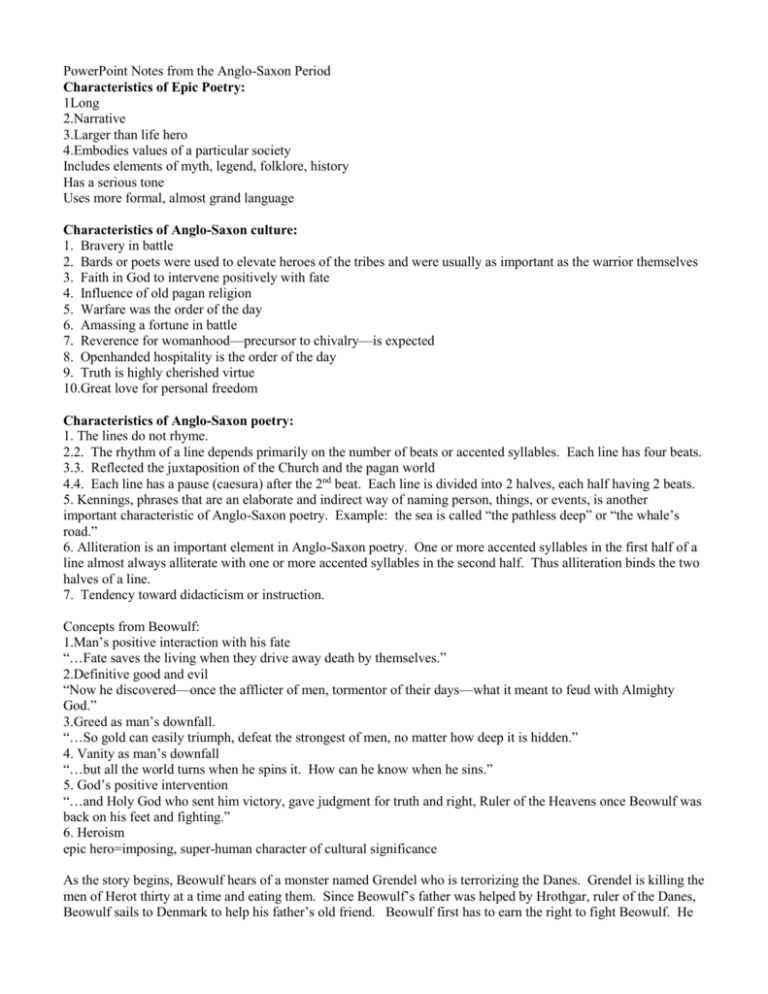
PowerPoint Notes from the Anglo-Saxon Period Characteristics of Epic Poetry: 1Long 2.Narrative 3.Larger than life hero 4.Embodies values of a particular society Includes elements of myth, legend, folklore, history Has a serious tone Uses more formal, almost grand language Characteristics of Anglo-Saxon culture: 1. Bravery in battle 2. Bards or poets were used to elevate heroes of the tribes and were usually as important as the warrior themselves 3. Faith in God to intervene positively with fate 4. Influence of old pagan religion 5. Warfare was the order of the day 6. Amassing a fortune in battle 7. Reverence for womanhood—precursor to chivalry—is expected 8. Openhanded hospitality is the order of the day 9. Truth is highly cherished virtue 10.Great love for personal freedom Characteristics of Anglo-Saxon poetry: 1. The lines do not rhyme. 2.2. The rhythm of a line depends primarily on the number of beats or accented syllables. Each line has four beats. 3.3. Reflected the juxtaposition of the Church and the pagan world 4.4. Each line has a pause (caesura) after the 2nd beat. Each line is divided into 2 halves, each half having 2 beats. 5. Kennings, phrases that are an elaborate and indirect way of naming person, things, or events, is another important characteristic of Anglo-Saxon poetry. Example: the sea is called “the pathless deep” or “the whale’s road.” 6. Alliteration is an important element in Anglo-Saxon poetry. One or more accented syllables in the first half of a line almost always alliterate with one or more accented syllables in the second half. Thus alliteration binds the two halves of a line. 7. Tendency toward didacticism or instruction. Concepts from Beowulf: 1.Man’s positive interaction with his fate “…Fate saves the living when they drive away death by themselves.” 2.Definitive good and evil “Now he discovered—once the afflicter of men, tormentor of their days—what it meant to feud with Almighty God.” 3.Greed as man’s downfall. “…So gold can easily triumph, defeat the strongest of men, no matter how deep it is hidden.” 4. Vanity as man’s downfall “…but all the world turns when he spins it. How can he know when he sins.” 5. God’s positive intervention “…and Holy God who sent him victory, gave judgment for truth and right, Ruler of the Heavens once Beowulf was back on his feet and fighting.” 6. Heroism epic hero=imposing, super-human character of cultural significance As the story begins, Beowulf hears of a monster named Grendel who is terrorizing the Danes. Grendel is killing the men of Herot thirty at a time and eating them. Since Beowulf’s father was helped by Hrothgar, ruler of the Danes, Beowulf sails to Denmark to help his father’s old friend. Beowulf first has to earn the right to fight Beowulf. He tells Hrothgar about his victories. Then he asks permission to wage this battle and tells the story of his glories to earn the right to fight Grendel. One of Hrothgar’s men, Unferth, resents Beowulf’s presence but can’t object much since he has been unable to kill Grendel himself. Beowulf berates Unferth for this. Hrothgar gives permission. The battle begins. Grendel enters Herot expecting no opposition. He pays for that mistake with his life. Grendel snatches up his first victim, but it is also his life. When he grabs Beowulf, the tables are turned. Grendel is now the victim, helpless in the grasp of the stronger warrior. He slinks off, bleeding to death, defeated. The Danes and Geats celebrate their victory and sing his praises. But the victory celebration doesn’t last long. Grendel’s mother takes revenge by capturing Hrothgar’s best friend and retrieving Grendel’s arm. Beowulf is called into action once again, but this time will fight his battle in the monsters’ hellish lair. He goes into this battle fully armed but finds that his weapons have no effect. Beowulf is able to kill Grendel’s mother. How does he accomplish this? When he returns to his home, he is made king of the Geats and reigns for fifty years until his battle with the dragon. The dragon has several functions. He symbolizes death and is also the guardian of treasure. Beowulf is now an aged warrior, but he is determined to fight the dragon that has attacked his people. He only has one person who fights beside him. The others have run in terror from the certain death from the fire-breathing monster. Does Beowulf kill the dragon? Does the dragon kill him? What is Wiglaf’s part in the battle? How is Beowulf the perfect Anglo-Saxon hero? What happens to Wiglaf? Beowulf dies a hero’s death, fighting the dragon. He receives the burial rightly due to a king and hero. All can see, as they approach by ship, the man who led the Geats and the greatness that he achieved. Concepts of Anglo-Saxon society: Loyal dependency Wyrd—fate; the idea that you die when you die, that no one sings your song. Sacrifice of self for one’s king or leader Wergild – man’s price or brother’s fee Boasting – states names, heritage, parents, parents’ occupations, 3 accomplishments, and 1 future accomplishment Anglo Saxon Ideals: Love of glory was a ruling motive Allegiance to the king or lord is cherished and demanded. Reverence for womanhood—precursor to chivalry—is expected There is a great love for personal freedom Open handed hospitality is the order of the day. Truth is a highly cherished virtue. Sentiments are usually suppressed



